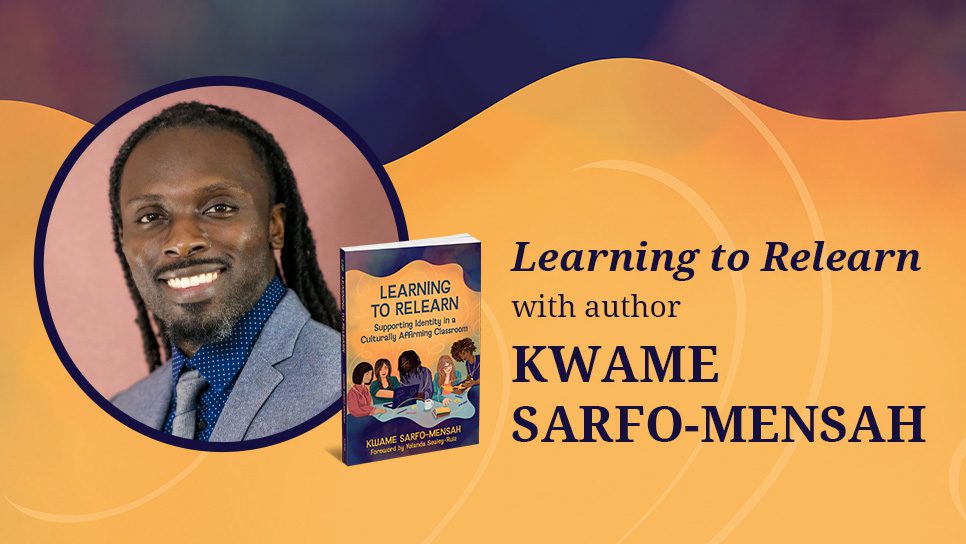Learning to Relearn with Author Kwame Sarfo-Mensah
Reading time
Date posted

A Q&A with Kwame Sarfo-Mensah, the author of Learning to Relearn: Supporting Identity in a Culturally Affirming Classroom.
1. What does a culturally affirming classroom look like?
A culturally affirming classroom is a space where all students can be their full authentic selves because their teacher genuinely embraces who they are. It values self-expression, ensuring that students don’t have to leave parts of their identity at the door. It is also a space where teachers critically examine their instructional approach and ensure that the curriculum accurately reflects the historical and lived experiences of marginalized communities. When teachers make that commitment, they are centering the full humanity of their students.
2. Learning to Relearn is divided into two parts, the first focusing on historically marginalized identities and the second on strategies and actions teachers can take to combat inequity. How would you recommend readers approach and use your book?
Learning to Relearn allows readers to jump around between chapters as needed. However, I recommend starting with Chapter 1, which examines and challenges the culture of whiteness in schools. It’s crucial to acknowledge the prevalence of white dominant culture in our schools because it influences values, curriculum, policies, and perspectives.
Once readers have completed Chapter 1, they can explore Chapters 2-5, which provide context for the tools and strategies in Chapters 6-9. Educators should consider the racial demographics of their schools and focus on the chapters in Part 1 that align with their student population. For example, if a school primarily serves Black and Latinx students, Chapters 2 and 5 will be particularly relevant. From there, they can move on to the practical strategies outlined in Chapters 6-9.
3. Your book includes a chart on the difference between “allies” and “co-conspirators.” What do you hope readers take away from this distinction?
The key takeaway is that allies often engage in minimal support for anti-bias, anti-racist (ABAR) work, while co-conspirators are deeply engaged in the work. For white educators, it’s important to recognize that their colleagues of color should not bear the burden of these efforts alone. Since the education system is rooted in white dominant culture and has historically marginalized BIPOC communities, white educators must use their privilege to advocate for change and challenge systemic inequities.
Being a co-conspirator also requires risk. That might mean jeopardizing one’s reputation, professional advancement, or, in extreme cases, even a teaching career. However, meaningful change demands action and commitment.
| Allies | Co-conspirators |
|---|---|
| Read antiracist books and literature for the sole purpose of engaging in intellectual dialogue with each other. | Read antiracist books, engage in intellectual dialogue, and use the knowledge they learned from their readings to combat racial injustice and inequities within their school communities. |
| Wear apparel and accessories with antiracist messaging to express their support for their BIPOC colleagues. | Wear apparel and accessories with antiracist messaging to express their support for their BIPOC colleagues and amplify specific issues/causes that they are actively combating through actions. |
| Privately thank their BIPOC colleagues for speaking up during a meeting but stay silent during the entire meeting. | When given permission from their BIPOC colleagues to intervene, openly speak up/call out racist actions and inequities alongside their CIPOC coleagues during a meeting. |
| Acknowledge that there are racist school policies that marginalize their BIPOC students. | Acknowledge that there are racist school policies that marginalize their BIPOC students and take measures to eradicate the racist policies from the handbook. |
| Sign a petition to support the movement. | Sign a petition and actively engage in the grassroots organizing of the movement. |
| Engage in low-risk actions that will almost guarantee that they’ll still have a job. | Engage in high-risk actions that could jeopardize their job status and, ultimately, put their career on the line. |
Table 1.2 Behaviors of allies vs. co-conspirators
4. One reason you stated for why this book is necessary now is the increased pushback and censorship teachers are facing for diversity, equity, and inclusion (DEI) work in schools. What advice do you have for educators looking to step into the role of co-conspirator?
The great James Baldwin once said, “A teacher who is not free to teach is not a teacher.” We are witnessing significant challenges in education, including book bans and the censoring of critical pedagogy, ABAR curricula, and liberatory scholarship. These efforts must be actively resisted.
This school year is about reclaiming academic freedom, teaching the truth, and providing learning experiences that genuinely connect to BIPOC students. Educators must move from inaction to action. No matter how small the contribution, every effort matters in the fight for equity in education.

Learning to Relearn: Supporting Identity in a Culturally Affirming Classroom
Rooted in the principles of antibias, antiracist (ABAR) education, this book offers a dynamic roadmap for teachers seeking to dismantle systemic biases and foster inclusive spaces that honor intersectional student identities.